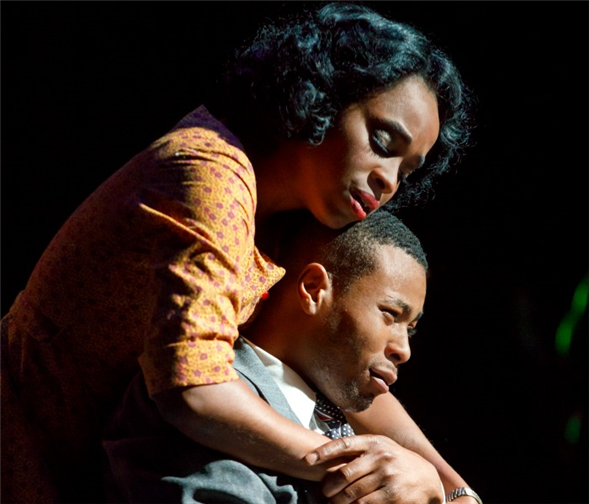Translate Page

Obie-winning playwright Dominique Morisseau completes her Detroit Project trilogy with Paradise Blue
---
Earlier this month, Dominique Morisseau's Signature Theatre residency kicked off with a little drama. At an early preview of her play Paradise Blue, cast member Simone Missick had a scheduling conflict. So Morisseau, who earned a BFA in Acting from the University of Michigan before becoming a dramatist, stepped into her own show.
But fans of the prolific playwright (Pipeline, her Obie-winning Skeleton Crew) needn't worry -- that was a one-night gig. Over the next five years, Signature will mount three of Morisseau's shows, starting with Paradise Blue.
The drama is the final installment of her Detroit Project, three plays chronicling the lives of African Americans in the Motor City in different decades. Detroit '67 ran at the Public Theater and the 2008-set Skeleton Crew played at Atlantic Theater Company, but this production marks Paradise Blue's New York debut.
It's 1949 and Detroit's African-American neighborhood of Black Bottom is in danger of being demolished by the city. Blue, a troubled trumpeter who inherited the local jazz club Paradise from him father, is torn between carrying on his family's legacy or selling out and moving on. The fate of his bandmates, girlfriend and a sexy stranger depend on his decision.
Morisseau, who grew up in Detroit, says she embarked on this cycle "to expose the humanity" of the residents of the downtrodden city. "To expose their fragility and their willingness to do whatever they can to build their dreams. I'm telling these stories so we know our history, so we can look at where we are in the present and understand what's underneath."
{Image1}
Although Paradise Blue is set almost 70 years ago, its narrative about a community of color being stripped of its character in the name of commerce feels incredibly current. Yet while Black Bottom is Blue's lifelong home, he's haunted by memories of his challenging existence there, and the play itself is a kind of ghost, a specter of a place and way of life that no longer exist. (In the '60s, the city razed the neighborhood to make way for freeways and forced the residents out to public housing projects.)
Paradise Blue had its world premiere at the Williamstown Theatre Festival in 2015, and the Signature production includes some of the same designers, cast members and the director, Ruben Santiago-Hudson. "This is our third time dancing together on a production and I just love working with Ruben," says Morisseau of the Tony winner, who's known for his work on August Wilson plays, which have been hugely influential on her writing. "We argue and we push each other, but there's mutual love and respect between us. I can't even imagine him not doing this play."
Morisseau is also happy that Santiago-Hudson knows Detroit well, having attended Wayne State University there. And Missick, the actor Morisseau subbed for earlier this month, is an old friend from the Motor City. "Simone and I went to the same elementary school," she says. "It's really special to have her."
Morisseau's next project also has a Detroit connection: She's fine-tuning her book for Ain't Too Proud—The Life and Times of the Temptations, which premiered at Berkeley Repertory Theatre last year and plays Washington, D.C.'s Kennedy Center this summer before heading to Broadway. This is the first time Morisseau has worked on a musical, but having grown up in Motown itself listening to The Temptations' extensive catalog, she's thrilled to be on board. "If you can get your mom and dad to meet their childhood idol," she says, referring to the group's founder, Otis Williams, "well, I don't even know."
Much like Pittsburgh did for August Wilson, Detroit has served as an amazing muse for Morisseau. "It has always been, for me, a metaphor for the rest of the country, but it's also been a metaphor for how the nation feels about black people," she says. "When people talk badly about Detroit, I think that they're using it to talk badly about a whole people, really." Morisseau's plays are a direct rebuke to that prejudice.
To read about a student's experience at Paradise Blue, check out this post on TDF's sister site SEEN.
---
Regina Robbins is a writer, director, native New Yorker and Jeopardy! champion. She has worked with several NYC-based theatre companies and is currently a Core Company Member with Everyday Inferno Theatre.
Top image: Kristolyn Lloyd and J. Alphonse Nicholson in Paradise Blue. Photos by Joan Marcus.
TDF MEMBERS: Go here to browse our latest discounts for dance, theatre, and concerts.